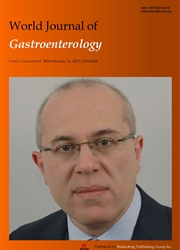

 中文摘要:
中文摘要:
目的:通过观察Faecalibacterium prausnitzii(F.prausnitzii)及其上清体外对大肠癌细胞增殖和凋亡的影响,探讨F.prausnitzii的抗肿瘤作用。方法:将大肠癌Lo Vo细胞培养于96孔板,待细胞贴壁后加入不同浓度的F.prausnitzii(1×10^7/m L、1×10^8/m L、1×10^9/m L)及其上清(1/2、1/5浓度),共同培养24 h或48 h后,以MTT法检测F.prausnitzii及其上清对Lo Vo细胞的增殖抑制作用;将大肠癌Lo Vo细胞培养于6孔板,待细胞贴壁后加入不同浓度的F.prausnitzii及其上清(同前),共同培养48 h后用Annexin V-FITC/PI双染色法对细胞染色后在流式细胞仪上检测F.prausnitzii及其上清对Lo Vo细胞凋亡的影响。结果:MTT结果显示,与对照组相比,不同浓度的F.prausnitzii及其上清对大肠癌Lo Vo细胞具有显著的增殖抑制作用(P〈0.05),且F.prausnitzii及其上清浓度越大、作用时间越长,其抑制作用越明显(P〈0.05),具有浓度和时间依赖性。流式细胞结果显示,与对照组相比,不同浓度的F.prausnitzii及其上清均具有诱导大肠癌Lo Vo细胞凋亡的作用,且浓度越大,诱导作用越明显(P〈0.05),具有浓度依赖性。结论:F.prausnitzii及其上清在体外具有抗肿瘤作用,其机制可能是通过诱导肿瘤细胞凋亡。
 英文摘要:
英文摘要:
Objective: The aims of current study were to investigate the antineoplastic activity of F. prausnitzii through observing in vitro the effect of F. prausnitzii and its supernatant on proliferation and apoptosis of colorectal tumor cells. Methods: The Lo Vo cells were first cultured in 96 well plates, then the Lo Vo cells were cultured for 24 h or 48 h with different concentrations of F. prausnitzii(l×10^7/m L, 1×10^8/m L and 1×10^9/m L) or its supernatant(1/2 and 1/5 Concentration) respectively after cell attachment, then the inhibitory effect on proliferation of Lo Vo cells was measured by MTT test. The Lo Vo cells were first cultured in 6 well plates, then the Lo Vo cells were cultured for 48 h with different concentrations of F. prausnitzii and its supernatant(the same as before) respectively after cell attachment, then the effect of F. prausnitzii and its supernatant on apoptosis of Lo Vo cells was measured by flow cytometry after staining Lo Vo cells with Annexin V-FITC/PI. Results: Result of MTT showed F. prausnitzii and its supernatant with different concentrations could inhibit proliferation of Lo Vo cells compared to control group(P〈0.05), and more and more obvious inhibitory effect with higher concentration or longer time showed time dependence and concentration dependence(P〈0.05). Result of flow cytometry showed F.prausnitzii or its supernatant with different concentrations could induce apoptosis of Lo Vo cells compared to control group(P〈0.05), and that effect increaseed with higher concentration showed concentration dependence(P〈0.05). Conclusions: Both F. prausnitzii and its supernatant have antineoplastic activity on tumor cells which are probably due to the induction of apoptosis.
 同期刊论文项目
同期刊论文项目
 同项目期刊论文
同项目期刊论文
 期刊信息
期刊信息
